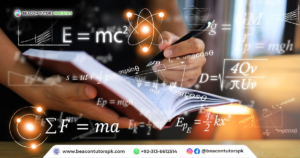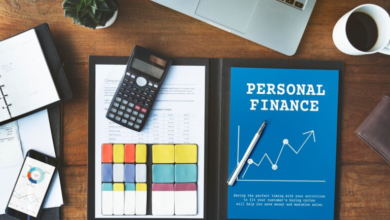The Ultimate Guide to A-Level Physics: Essential Study Notes

Starting A-Level Physics is like beginning a big adventure into how everything in the universe works. It’s a tough but exciting subject that takes you from the smallest parts of atoms to the vastness of space. This guide is here to help you through all the tricky parts of A-Level Physics, giving you helpful notes, tips on doing experiments, and ways to remember what you learn for exams.
How to Effectively Prepare for the A-Level Physics Exam?
Developing a Study Plan
Effective preparation for the A-Level Physics exam starts with a structured study plan. Break down the syllabus into manageable sections and allocate time for each topic, ensuring a balanced approach between theory and practical applications. Set realistic goals for each study session and stick to your schedule, allowing for flexibility to address more challenging topics as needed.
Physics A Level Syllabus
Familiarity with the Physics A-Level syllabus is crucial for effective preparation. Understanding the structure and key topics ensures that it covers all necessary material, leaving no surprises on exam day. A-Level Physics notes tailored to the syllabus can guide students through each topic methodically, ensuring a comprehensive review.
Active Learning Techniques
Engage with the material actively through question-and-answer sessions, group discussions, and teaching concepts to others. This approach not only reinforces your understanding but also highlights areas that require further study. Utilize mind maps, flashcards, and summary notes to organize and condense information, making it easier to review closer to the exam.
Emphasizing Understanding Over Memorization
While memorizing formulas and definitions is necessary, prioritize understanding the underlying principles and how to apply them. Tackle a variety of problem-solving exercises, focusing on the process rather than just the solution. This deep understanding will enable you to approach novel problems more confidently during the exam.
Utilizing A Level Physics Past Papers and Examiner Reports
Practicing with past exam papers is crucial for familiarizing yourself with the exam format and types of questions asked. Time yourself under exam conditions to improve your time management skills. Reviewing examiner reports can also provide valuable insights into common mistakes and areas of weakness, allowing you to adjust your study strategy accordingly.
Incorporating Practical Work
Given the significant portion of the A-Level Physics exam dedicated to practical skills, ensure that you are comfortable with conducting experiments and interpreting data. Participate actively in laboratory sessions, and practice writing clear and concise lab reports. Understanding the practical applications of theoretical concepts will enhance your overall grasp of the subject.
Seeking Feedback
Regularly seek feedback on your understanding and problem-solving skills from teachers, tutors, or study groups. Addressing misconceptions early and receiving guidance on complex topics can significantly boost your confidence and exam readiness.
Review and Adapt
Continuously review your study plan and strategies, adapting as needed based on your progress and areas of difficulty. Focusing on weak points in the final weeks leading up to the exam can make a significant difference in your performance.

Mastering Key Concepts in A Level Physics and Their Applications
Grasping Fundamental Physics Principles
A-Level Physics requires a solid understanding of fundamental principles and their practical applications. This journey begins with mastering physical quantities and units, where students learn to recognize that all physical measurements comprise a numerical magnitude and a corresponding unit. This foundational knowledge is critical for estimating physical quantities relevant to the syllabus.
SI Units and Measurement
A deep dive into the world of SI units equips students with the ability to recall base quantities like mass (kg), length (m), time (s), and others. Understanding derived units and the application of prefixes like kilo (k) and mega (M) is essential for expressing measurements in physics accurately. This understanding also aids in verifying the homogeneity of physical equations, ensuring that the units on both sides of an equation match, which is a fundamental aspect of problem-solving in physics.
-
Addressing Errors and Uncertainties
Physics experiments are not immune to errors, making it crucial for students to distinguish between systematic and random errors. Learning to assess the uncertainty in derived quantities by simple addition of absolute or percentage uncertainties refines experimental accuracy and precision. This knowledge is pivotal in conducting experiments and interpreting results with a critical eye.
-
Scalars and Vectors
Understanding the difference between scalar and vector quantities lays the groundwork for analyzing physical phenomena. Mastering how to add and subtract vectors, and represent a vector in terms of its perpendicular components, is vital for solving problems in kinematics, dynamics, and other areas of physics.
-
Kinematics and Dynamics
Delving into kinematics, students explore motion through equations, graphical methods, and the interpretation of velocity-time and displacement-time graphs. This segment demands a robust understanding of distance, displacement, speed, velocity, and acceleration. Practical applications include designing experiments to determine acceleration due to gravity, enriching the theoretical knowledge with empirical evidence.
In dynamics, the focus shifts to understanding forces, momentum, and Newton’s laws of motion. From conceptualizing mass as a resistance to motion change to applying F = ma for problem-solving, dynamics forms the core of A-Level Physics. Practical applications extend to experiments and problem-solving scenarios involving forces, providing a tangible understanding of theoretical principles.
Practical Physics and Experimentation
A-Level Physics is incomplete without hands-on experiments that allow students to apply theoretical knowledge to real-world scenarios. For instance, students explore the principles of conservation of momentum through elastic and inelastic collisions, enhancing their understanding of theoretical concepts through practical application.
Application in Physics Practicals
Physics practicals are a bridge between theory and application, making it crucial for students to engage deeply with experimental physics. This involves setting up experiments to explore concepts like the acceleration of free fall, the conservation of momentum, or the characteristics of waves. Such practical work reinforces the understanding of physics principles and hones analytical skills.
Effective Revision Strategies for Physics A-Level
Advanced Level Physics Revision
Revision for A-Level Physics requires a strategic approach that goes beyond mere reading. Incorporating Physics revision resources such as flashcards, summary sheets, and mind maps can help consolidate knowledge and facilitate quick recall of information. Additionally, focusing on Physics problem-solving techniques within revision sessions enables students to apply concepts in various scenarios, mirroring the exam’s demands.
Physics Study Tips
Effective study habits can significantly impact A-Level Physics preparation. Setting clear objectives, organizing study sessions around specific topics, and practicing active learning strategies can enhance study efficiency. Additionally, integrating A-Level Physics past papers into study sessions is crucial for familiarizing students with the exam format and question styles, improving time management skills during the actual exam.
Physics Revision Resources
A plethora of revision resources is available to A-Level Physics students, ranging from textbooks and online platforms to tutorial videos and interactive simulations. Diversifying study materials can cater to different learning preferences, making revision more engaging and effective. A-Level Physics notes that summarize key points from these resources can serve as a quick reference during final revision stages.
Conclusion
Getting through the A-Level Physics course is a big achievement. It opens doors to studying more science in the future and can lead to cool careers in things like engineering. This guide tried to make the journey a bit easier for you, showing you how to tackle hard topics, do well in practical labs, and ace your exams. Remember, studying Physics isn’t just about passing tests; it’s about understanding the amazing laws that make the universe tick. With hard work and the help of Beacon Tutors, you’re ready to do well in Physics and use what you learn to do great things in the future.




